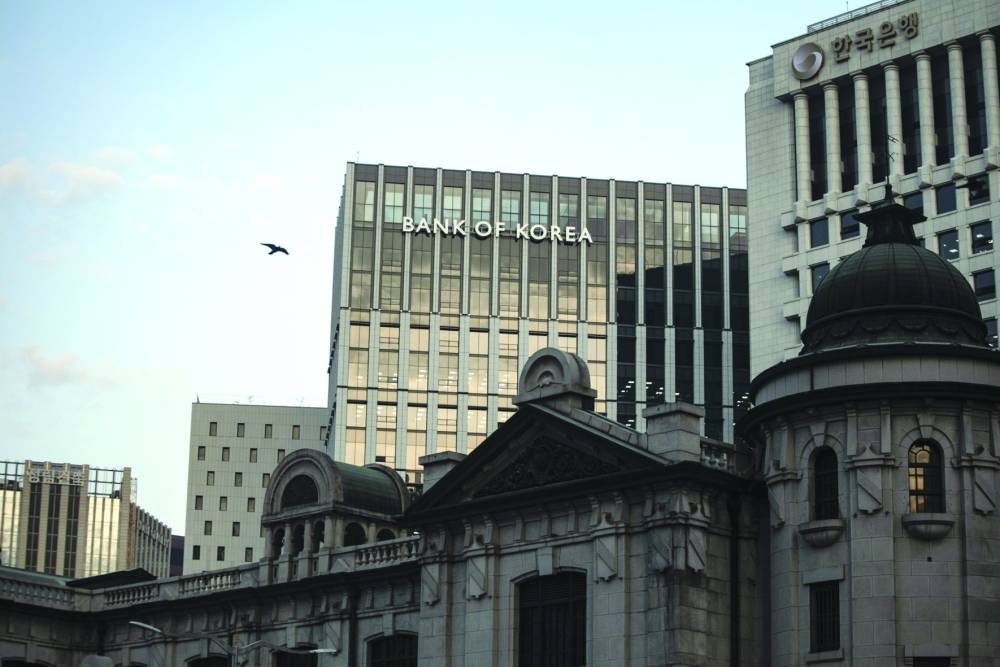Bank of Korea Governor Rhee Chang-yong sought to maintain focus on reining in inflation and household debt as the board left its benchmark interest rate unchanged and opted to remain hawkish ahead of major central bank events in the US.
The BoK kept its seven-day repurchase rate at 3.5% yesterday as forecast by all 18 economists surveyed by Bloomberg, and reiterated a pledge to stay restrictive for “a considerable time.” The BoK has stood pat since it last raised the rate in January.
In his press conference to explain the unanimous decision, Rhee said it will take “considerable time” before consumer inflation settles comfortably to a pace within the bank’s target of 2%. He also made it clear the board would closely watch Jackson Hole meetings later this week and the Federal Reserve decision next month.
“It’s quite a dilemma for us if the Federal Reserve maintains a tight policy for a considerable period of time and it starts to affect our monetary policy,” the governor said.
Fed Chairman Jerome Powell is set to deliver a keynote address at the annual Fed event in Jackson Hole on Friday. The annual meeting hosted by the Fed’s Kansas City branch is considered a key opportunity for flagging US policy direction outside regular rate-decision meetings. Rhee also noted China’s growing economic troubles that would potentially weigh on Korea’s growth.
While the BoK largely kept its economic forecasts intact, saying it still expects the economy to expand by 1.4% and consumer prices to rise by 3.5%, it trimmed its 2024 GDP growth forecast to 2.2%, a move that reflects the impact from slowing activity in China. The BoK also nudged up its 2023 estimate for core consumer inflation to 3.4%.
China’s economic doldrums are also expected to be on the agenda at Jackson Hole.
As was the case in recent meetings, all six members of Rhee’s board said they were open to another hike by a quarter percentage point if such a move is deemed necessary in the future, in a reminder that the battle against inflation remains at the top of their agenda.
The governor added that household debt levels are already weighing on economic growth and noted that they’ve increased more than expected in recent months. South Korea’s has one of the world’s highest household debt-to-GDP ratios, adding to challenges for policymakers who fear heavily indebted consumers will cut back on spending. How to bring debt down without causing a crash is a key issue, Rhee said, adding it remains his major goal during his term.
Rhee highlighted other persistent concerns weighing on growth, saying banking-sector risks have yet to be fully resolved. Although authorities have taken steps to stabilise the sector, pockets of vulnerability remain, he said.
The trade-reliant economy has been hit by weak overseas demand for South Korean products, particularly in China, where property-market woes are among a host of challenges undermining the growth outlook. South Korea’s exports to China fell 25.1% in July, outpacing the 16.5% decline in overall shipments.
“The status quo is the best way to go for the time being,” said Kim Sung-soo, a fixed-income analyst at Hanwha Investment & Securities Co. “We could be seeing a hold continuing at least through the first quarter of next year.
Even as risks to the growth outlook persist, the BoK has been steadfast in its battle to cool price pressure as a top priority. Consumer inflation slowed to 2.3% in July, but monetary authorities expect it will accelerate back to the 3% level toward the end of the year.
Adding to the risks for the BoK is the possibility the Federal Reserve may keep its policy rate elevated for longer as the US economy chugs along with more momentum than previously expected.
That’s giving the BoK another reason to keep its policy restrictive as Korean rates remain below US rates by the widest differential on record. That gap has weighed on the won this year, although Rhee said current currency levels aren’t a reason for concern.
“While Rhee left the door open to more policy tightening, the possibility for that to become a reality is low, especially since Rhee acknowledged Korea’s current real interest rate is high,” said Stephen Lee, chief economist at Meritz Securities.
The won has been among the weakest performers in Asia this month. Its deterioration against the dollar was a key reason the BoK raised the rate at a faster-than-usual pace in the second half of last year.

The Bank of Korea complex in Seoul, South Korea. The BoK kept its seven-day repurchase rate at 3.5% yesterday as forecast by all 18 economists surveyed by Bloomberg, and reiterated a pledge to stay restrictive for “a considerable time.”
